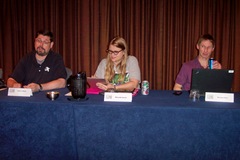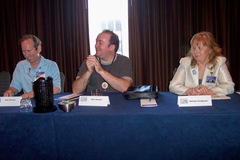 I just walked back in my door after the bus ride back from Kansas City.
I just walked back in my door after the bus ride back from Kansas City.
I had a great time at the convention over the weekend. I taped interviews with Pete Abrams and George R.R. Martin, which I will try to sit down and transcribe over the next few days. I attended panels relating to the coming age of e-books, and to the effects of new technology on our daily lives.
I met and had dinner with occasional TeleRead contributor Moriah Jovan and her family. And I had the chance to put together some impressions.
TeleRead covers a lot of e-book and publishing industry conferences, such as Book Expo America. But there is a value to attending conventions focused on the literary side of things as well.
Publishing industry conferences are where the middle segments of the book-distribution chain—publishers and e-book vendors—can be found. But science-fiction conventions such as ConQuesT are where the endpoints, the writers and readers, hang out—and we shouldn’t forget that these are just as important to the publishing process, since they’re the ones who provide the source material at one end and consume it at the other.
There were some publishers at the con, but mainly small presses such as Yard Dog Press. (Of course, Toni Weisskopf from Baen was there, too. I only wish I’d thought to check with her for copies of the new Baen CDs at the beginning of the event!)
I think that it would be a good idea for publishers and e-book companies to have more of a presence at these events, rather than sequestering themselves away at industry events where they only talk to other companies just like them. As a number of articles lately have said, publishers need to realize that, in the final analysis, their customers are readers, not just stores, and they should try to get a better idea what those readers are thinking. It’s time to come down off the mountain.
Panels of Interest
There were a number of panels of interest to me from the e-book and e-media point of view. There was the “Decline of the Print Empire” panel, concerned with the rise of e-books and decline of print, which I will cover more fully in a separate post. But there were other interesting panels as well.
 “The iPad for Light Days,” hosted by long-time sysadmin and techie types Eric V. Olson, Marziah Karch, and Michael Pins, focused on how more and more frequently, early adopters are serving double duty as unpaid beta testers. The iPhone, the Kindle, the iPad, Google, and others were brought up as examples of this.
“The iPad for Light Days,” hosted by long-time sysadmin and techie types Eric V. Olson, Marziah Karch, and Michael Pins, focused on how more and more frequently, early adopters are serving double duty as unpaid beta testers. The iPhone, the Kindle, the iPad, Google, and others were brought up as examples of this.
The panelists placed a lot of the blame on Netscape, the original graphical web browser, which kept releasing neat new features faster than designers could learn how to implement them. They also brought up the “hacker mindset”—a steadfast belief that “everything will work right because I believe everything will work right”—and the fact that the advantage inherent in being first to market means companies actually have less incentive to test their products anymore. “It became okay to release beta code to the world, because if you release the code first you get more business.”
Something else that made me think came when another panel on remakes and adaptations digressed into matters of how the way we consume media has changed over the years.
 Melinda Snodgrass, a novelist and scriptwriter whose work includes episodes of Star Trek: The Next Generation, pointed out that it is fairly common now for viewers not to watch shows week to week, but to save several episodes up at once on the TIVO, or download or rent a season at a time.
Melinda Snodgrass, a novelist and scriptwriter whose work includes episodes of Star Trek: The Next Generation, pointed out that it is fairly common now for viewers not to watch shows week to week, but to save several episodes up at once on the TIVO, or download or rent a season at a time.
It turns out that some shows that were very thrilling and suspenseful when watched episodically can actually suffer from being watched all at once. Conversely, some shows that work great viewed all at once can seem inscrutable on a weekly basis.
Pete Abrams, cartoonist of Sluggy Freelance, pointed out that he had a similar problem with a story arc he wrote called “Oceans Unmoving”—daily readers felt it dragged on and on and on, but readers who came at it through the archives found it enthralling.
It seems to me this lesson should have some resonance for electronic text media as well. Perhaps with the Internet, books no longer need to be delivered all at once. We could again experiment with serialized works, the way Dickens and others did in the 19th century. (Elizabeth Bear has been doing this very thing with her Shadow Unit shared universe, and Neal Stephenson and Greg Bear are about to do something similar with their Mongoliad.)
I enjoyed the event immensely, and ended up with a number of interesting new things to think about. If you’ve never attended a science fiction convention, you should definitely check one out.
































